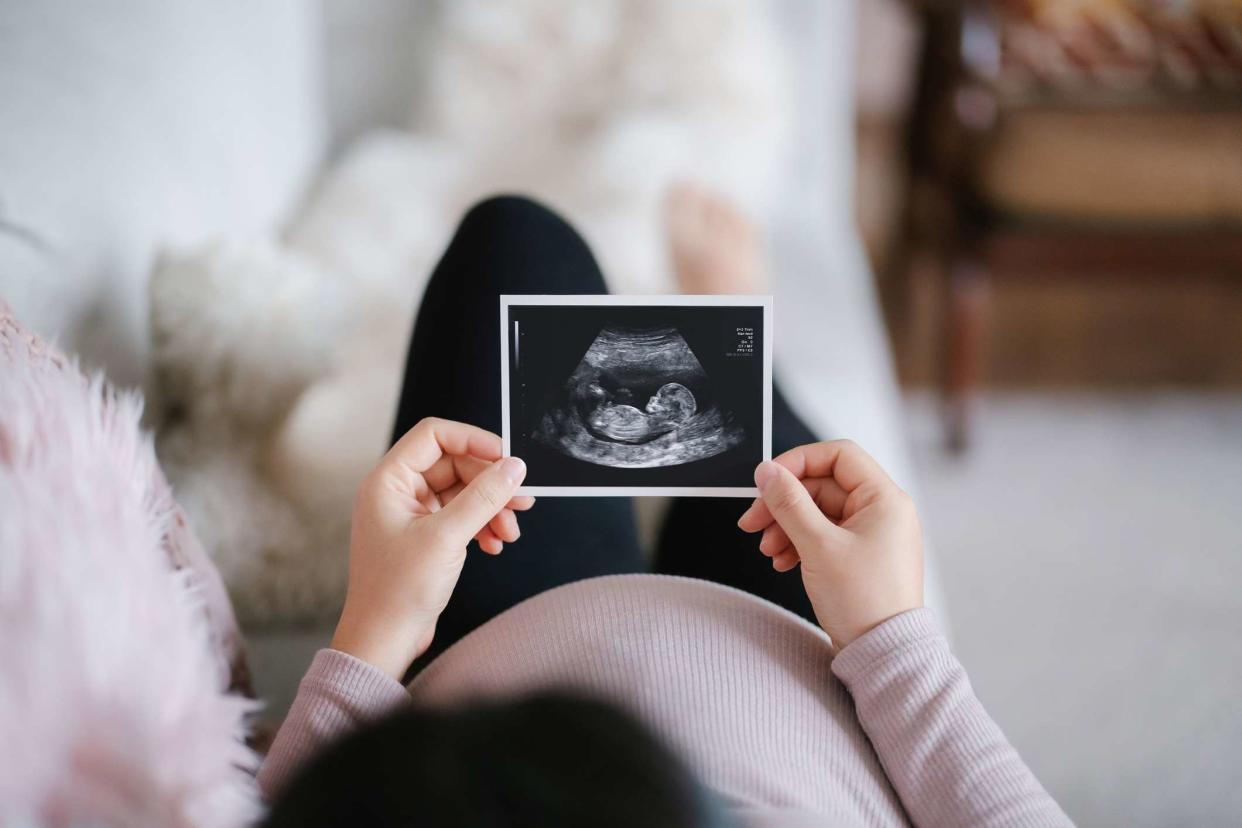Can the Nub Theory Predict the Sex of My Baby?

AsiaVision / Getty Images
As soon as you find out you're pregnant, you might start wondering what your baby will be like. You may begin to imagine how they'll look, what kind of personality they'll have, and which sex they'll be. While you'll need to wait to find out some of that information, you can find out your baby's biological sex before they are born.
Some may claim that they can accurately predict a baby's biological sex as early as 12 weeks, just by looking at an ultrasound. Dubbed the "nub theory," this method looks at the genital tubercle, or the "nub" that will eventually develop into male or female genitalia, in relation to the fetus's spine.
Ahead, learn more about how the nub theory works and how reliable it really is.
What Is the Nub Theory?
Nub theory predicts a fetus's biological sex by analyzing the genital tubercle. The genital tubercle, or "nub," is a structure that will develop into genitalia. Before 15 weeks gestation, the nub appears the same in all fetuses. But some small differences may be present that can help predict whether the nub is more likely to develop into a penis or a vulva.
According to nub theory, you have to look at the angle of the nub relative to the spine. For nub theory to work, the ultrasound needs to take a side profile view and the nub and spine must be clearly visible.
A nub that measures at greater than a 30 degree angle relative to the spine is likely to become a penis. Nubs that are likely to become vulvas will generally be parallel to the spine. However, any nub under 30 degrees is considered female, according to nub theory.
Related:Can the Ramzi Theory Really Predict a Baby's Sex?
When Did Nub Theory Come About?
Nub theory was discovered by ultrasound technicians who started to notice patterns in what they were seeing on their scans. It does not have any medical recognition.
We don't know exactly when or who first came up with the idea, but a small study was first conducted on the theory in 1999, which showed a 98% rate of accuracy after 13 weeks gestation.
How Accurate Is Nub Theory?
Medical experts can't say for sure how accurate the nub theory is, but most physicians refute it as a definitive prediction of a baby's sex. "The nub theory is just a theory and it is not used in an official way by ultrasound technicians or doctors," says Monte Swarup, MD, FACOG, a board-certified in OB/GYN in Chandler, AZ and the founder of HPD Rx.
All in all, minimal scientific research has been done on nub theory, but the studies that were conducted deteremined that there is some merit to this theory. A study conducted in 2006 found that biological sex could be predicted at 85% accuracy by 12 weeks and 97% accuracy by 13 weeks. A later study with a larger sample size found that nub theory was only reliable after 12 weeks.
It’s important to keep in mind that these studies only looked at a small number of cases. "In order for the Nub Theory to be completely reliable, larger-scale studies would need to be conducted," notes Nisarg Patel, MBBS, MS, an OB/GYN at ClinicSpots.
Related:Ultrasound Signs for Determining Baby's Sex
Other Ways to Predict Baby's Sex
There are several ways to predict your baby's biological sex before they are born. One is through Noninvasive Prenatal Testing (NIPT). The NIPT test is a blood test that can tell you about your baby's chromosomes. Biological sex is determined by chromosomes (females have two x chromosomes while males have one x chromosome and one y chromosome).
If you are using Assisted Reproductive Technology (ART), such as in-vitro fertilization (IVF), you can use a similar screening test to see which sex chromosomes your embryos have.
Biological sex may be predicted with a high degree of accuracy at your 20-week ultrasound. By this gestational age, your ultrasound technician should be able to clearly see a penis or vulva when scanning your baby. However, it's possible that your baby's position will block the genital area so biological sex can't be predicted.
Ultimately, the Nub Theory can be a potential tool for predicting the sex of your baby if you are curious. However, it’s important to note that it is not 100% reliable and should not be taken as medical advice. "If you’re interested in finding out the sex of your baby early on in pregnancy, it’s best to speak with your doctor or midwife about other reliable methods of gender prediction." says Dr Patel.
A Word From Verywell
Nub theory may help you make a prediction of your baby's biological sex before 15 weeks gestation. Just remember that you still might end up surprised at subsequent ultrasounds or when your baby is born. At the end of the day, nub theory is just a theory, and should not be taken as medical advice. If you have any questions or concerns about your pregnancy, be sure to reach out to your OB/GYN, midwife, or healthcare provider.
Read Next:How To Handle Gender Disappointment